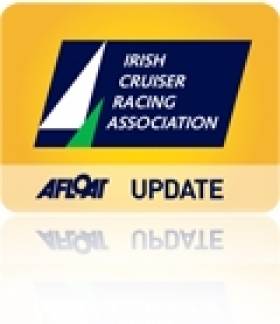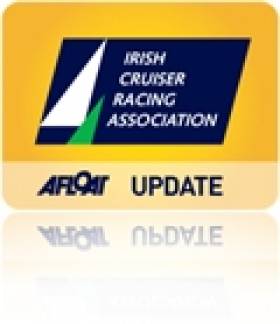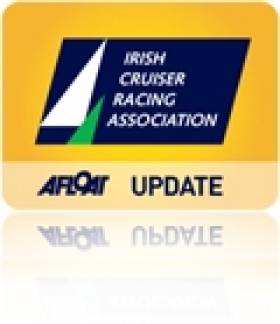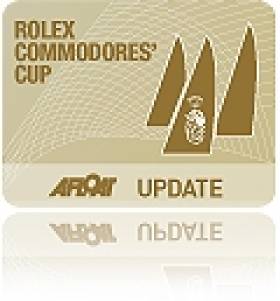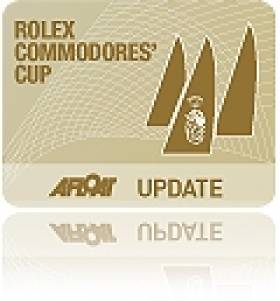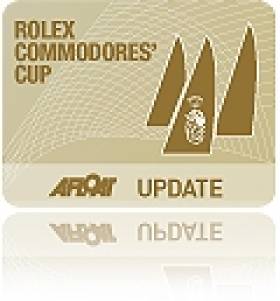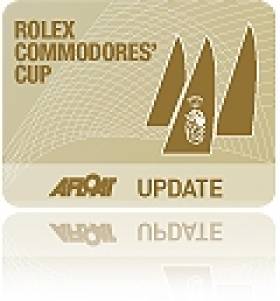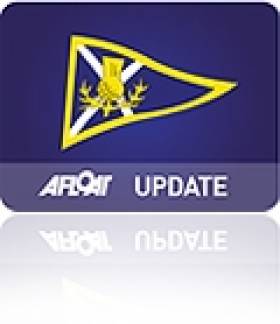Displaying items by tag: Irish Cruiser Racing Assocation
ICRA Sailors Are Keen to Reel You Into The Cruiser Racing Game
#cruiserracing – For the ordinary participant, sailing events just seem to happen. All they have to do personally is simply turn up, and get involved each year in a programme which somehow fits together both locally and nationally. But a lot of effort goes on behind the scenes to make events run smoothly, and innovative thinking has re-shaped the annual fixtures list. W M Nixon takes a look at the Irish Cruiser Racing Association, which in twelve short years has changed the face of our sport.
On Tuesday of this week, in an anonymous hotel room just about as far from sailing waters as it is possible to get in Ireland, the Executive Committee of one of the most effective national sailing bodies met for their key pre-season meeting to monitor the provision and development of the waterborne sport of hundreds of boats, and thousands of sailors.
As they're all busy folk giving of their time on a voluntary basis, the people who run the Irish Cruiser Racing Association approach their tasks with a minimum of fuss. Convenience and efficiency is all. And those who think that some of the most important decisions in Irish sailing are taken in sedate national headquarters, or in elegant committee rooms in stylish and historic yacht club premises, would find pause for thought in this hotel boardroom in Portlaoise.
There isn't so much as a picture on the wall to distract them from their deliberations as they progress down the agenda in businesslike manner. And as for taking a breather and maybe a refreshing walk along the waterfront at the nearest sailing location - as they'd say in New York, fuggedaboudid. Portlaoise is equidistant timewise from all the main sailing centres – hence its selection for meetings of a national committee - yet in our watery island, it almost uniquely manages to be more than an hour from the nearest sailing location.
That of course may change when the big new Dublin & Leinster Reservoir is constructed a few miles north, up by Mountmellick, for we're assured that it will include a recreational boating facility. But as it's a reservoir, the boats on it won't be those catered for by ICRA, which are boats with lids and loos. And as for the sport the Association provides, hotshot young dinghy sailors used to sniffily dismiss it as "truck-racing". But in the recessional years, you didn't hear that very often, for in the thin times ICRA's racing was sometimes the only show in town, and at its best it has been a very good show indeed.
The Association has been in being for a dozen years now, introduced at a ground-breaking meeting in 2002 in Kilkenny by the late Jim Donegan from Cork, Commodore of the South Coast Offshore Racing Association, and Fintan Cairns of Dun Laoghaire. To describe Fintan merely as a former Commodore of Dublin Bay Sailing Club scarcely gets the outline of the man. In his quiet way of much voluntary work in sailing, and in his continuing enthusiasm for personally going sailing whenever and wherever it's possible, and in whatever boat is available, he's inspirational.
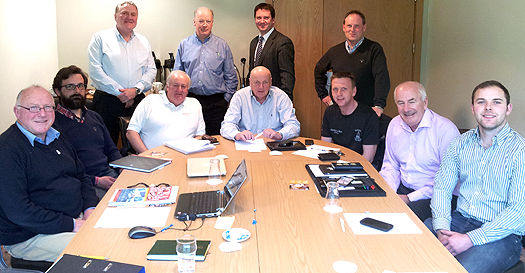
The ICRA Executive Committee meeting on Tuesday in Portlaoise includes (front row left to right); Denis Kiely (secretary ICRA), Cxema Pico (web and social media), Fintan Cairns (treasurer) Nobby Reilly (Commodore), Simon McGibney (WIORA), Barry Rose (Commodore's Cup Team Manager), and Brian Forde. Back row: Jack Roy (ISA Director), Ed Alcock (ISA Racing Manager), Ronan Enright (SCORA) and Peter Ryan (ISORA). Missing from photo is Technical Adviser Mark Mills, who'd been in attendance earlier but had to return to his Wicklow design office to complete the plans of another race winner.
Naturally there were those who wondered – this writer included – about the wisdom of trying to inaugurate a cruiser racing association based around a landmass, even when it's the Emerald Isle. Surely such racing is all about specific identification with sea areas such as the Irish Sea? But the Irish Sea Offshore Racing Association – at its height in the 1970s with its best annual entry in the season-long championship being 107 boats – was in rapid decline as lifestyles changed.
Those who in times past would have trundled off on a Thursday evening to sail maybe across channel to the start of an ISORA weekend event, and perhaps not return home until Sunday or even Monday, now found that modern expectations of inclusive family life precluded much of that. The contemporary mantra of "fun for all the family" simply cannot be applied to time-consuming offshore racing in the old-fashioned sense.
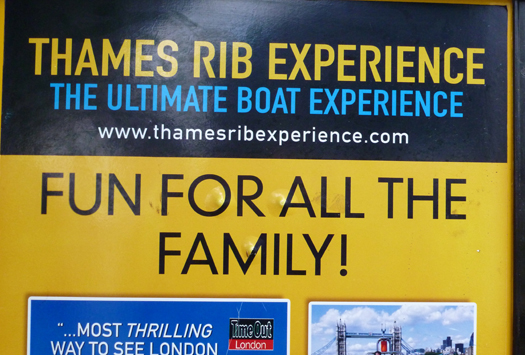
This sort of thing is all very well, but its popularity has signalled the death knell for traditional time-consuming family-unfriendly offshore racing. Photo: W M Nixon
Certainly you'll find family members who sail together on a cruiser-racer, but it's seldom as a complete family unit. So seldom, in fact, that when it occurs, it's a news item. And though quite often you will get a father and one or two sons sailing together, equally often you'll find the sons enjoy racing against the father if the old codger has managed to keep up with his sport, with no holds barred.
But in this age of conspicuous family togetherness, if cruiser-racing in anything other than in a club context in a few very local centres was going to prosper, it had to be in a format which was ultimately family-friendly, at the very least allowing whoever was the involved one – be it father, mother, son or daughter – to show the face with reasonable regularity when the rest of the family gathered.
Whether or not they do take the opportunity to be enthusiastic family members is something else altogether. What matters is that the new look to Irish offshore racing introduced the annual ICRA Nationals, held each year at a different venue, and rotating around the main centres in order to encourage those from other centres to make the voyage to the year's championship in anticipation that they would in turn be rewarded by having their club invited to host the Nationals the following year, or perhaps the year after that.
As for getting the boats to the selected venue, there might be a useful passage race – last year's Dun Laoghaire to Dingle conveniently brought boats to Tralee for the ICRA Nats 2013 – but delivery races aren't essential. The boat can be sailed to the venue by a small delivery crew, and then our marvellous new motorway system, which might have been developed with the needs of ICRA in mind, delivers the FVRO (Formerly Very Rich Owner), plus those crewmen in fulltime shore-based gainful employment, for a hectic extended weekend of racing which hopefully includes one extended coastal event in order to justify the moniker of Cruiser Racing.
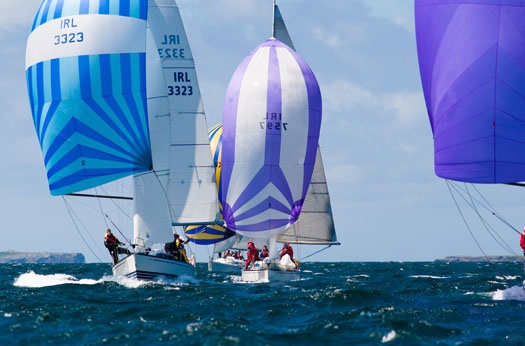
ICRA Nationals 2013 in Tralee Bay. When the sun shone, it was great. Photo: Robert Bateman
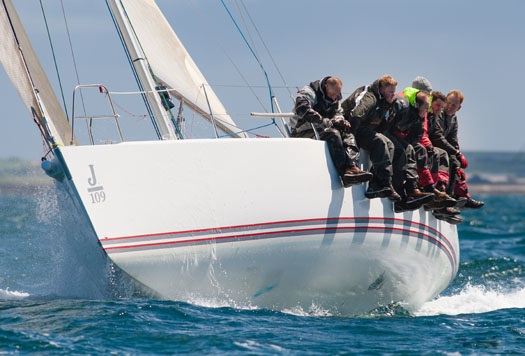
Not for the faint-hearted....the racing in Tralee Bay last year served up challenging sailing. Photo: Robert Bateman
It's not offshore racing as we used to know it, but it's what the people want, and it suits modern life. Although it may at times seem like no more than a glorified version of what any One Design keelboat class provides at its annual championship, the fact that each boat is racing to her own rating is not a drawback – it's part of the attraction. It means that in theory at least, any cruiser-racer sailed with reasonable competence is in with a chance. In fact, she and her crew are in with a double chance. Thanks to the number-crunching skills of ICRA's Denis Kiely, the backroom-boy par excellence, ICRA Championships are run with all boats under the the straight IRC rating, but also under the individual performance-related ECHO system.
It's the equivalent of having a two-strand golf major, with the usual open division, but also with people playing off handicap. Sporting purists might disdain it, but ICRA in their innate and growing wisdom know it's very important, and their double prize system reflects this.
However, the Association also aims at the clearest heights, and their work as organisers of the national team for the Commodore's Cup was crowned with the success of the outright win for Ireland in 2010, with ICRA Commodore Barry Rose of Cork in the driving seat of an outstanding campaign. That the Association's ethos is based on steady work without fuss was underlined by their reaction to becoming the Mitsubishi Motors "Club of the Year" for 2011 as a direct result. Sometimes when a club gets this award, it's received with a sense of entitlement. But in the case of ICRA, their delighted surprise was genuine, and they showed it by the entire management team turning up for the award ceremony.
Yet while the heights of the international offshore scene are within ICRA's remit, equally the Association's officers are involved with making the sport seem more accessible. I've long since given up being concerned by being told that there is a public perception of sailing as being exclusive and elitist. So what if it is? After all, any sport is competitive. And where you get competition, you eventually have winners. To get winners, you need selection. And one person's selection is another person's exclusion. Thus anyone selected seems part of an elite to those who aren't.
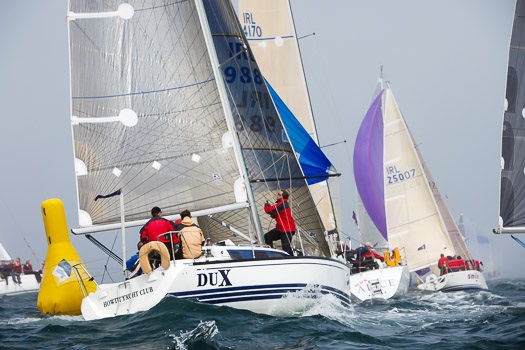
Classic ICRA racing at the Nationals in the Irish Sea, with seasoned campaigner Anthony Gore-Grimes' X 310 Dux on the way to another success. Photo: Robert Bateman
In sailing, it's something which is emphasised by the demands of campaigning a cruiser-racer. Running a successful boat-with-a-lid is like running a very intense small business. In addition to the management of the boat and equipment, you have the continuous personnel administrative demands of selecting and recruiting an effective crew, people who'll work as a team yet have individual talents which can be harnessed for the greater good. And they'll also need to contribute to the inter-personal harmony on board, often in conditions of acute physical discomfort.
To be a useful element in this, it's every bit as important to think about what you might bring to the party. Anyone who needs to be mollycoddled into a crew and is hyper-sensitive about exclusivity or elitism or whatever, is unlikely to make the grade. And it certainly won't be a gentle democracy on board, but equally an insensitive dictatorship won't work either. It's a group with a consultative leader in a continuous state of dynamic development in continually changing situations.
At the end of the race or the series, it may well be that you and your shipmates will be only too glad to see the back of each other. But then again, the shared experience, and the delight of sailing the sea when the going is good and the right judgements have been made, can be so rewarding that naturally a huge camaraderie will develop. And that of course will seem exclusive and elitist to those who haven't been part of it.
But believe me, offshore racing skippers are cunning devils, and they're always on the lookout for new crew material in all sorts of unusual ways. It is indeed like the innovative management of a successful business. A case in point was the great Denis Doyle of Cork with his remarkable partnership with the 51ft Moonduster for 20 years from 1981 onwards. In his earlier offshore racing days, Denis had been of the generation which expected the owner to be the helmsman. But by the time Moonduster came along, he'd learned to delegate - he knew that others could be better on the wheel. And in his first years with the boat, he was successfully crewed by all the top young offshore sailors and dinghy helmsmen of Crosshaven.
But gradually they moved on to boats of their own, and by the 1990s there were more boats than crews to go round. So Denis thought afresh, and made Moonduster berths available to cadets from the Naval Base up Cork Harbour at Haulbowline. But it was a case of a little learning being a dangerous thing. What the naval cadets already knew about ship handling from their professional training as sailors actually got in the way of crewing a sailing racer. So the bould Denis linked up with Commandant Barney Goulding of the Irish Army, and invited him to bring army trainees along. They were enthusiastic, but they didn't have any pre-conceived notion of what sailing involved, yet were mustard keen to learn. It worked a treat.
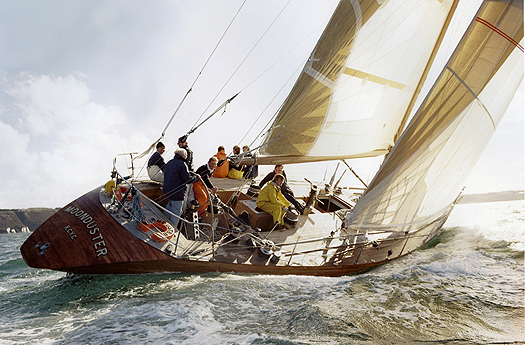
Moonduster in her element with owner Denis Doyle (unusually) at the helm. Photo: Robert Bateman
But things have moved on, and recruiting for cruiser-racer crews now has to operate in the open market. Knowing this, ICRA Commodore Nobby Reilly of Howth is organising a Come Sailing Day at his home club on Saturday May 3rd using the flotilla of SailFleet J/80s. This attracted more than 80 interested newcomers last year, they've honed the programme to make it even more user-friendly this year, and as a bonus, three selected (that word again) talents emerging from the day's activities will be invited to join the crew of a Volvo 70 which David Ryan has chartered for this year's Round Ireland Race on June 28th.
Nobby Reilly himself knows a thing or two about the wily ways of crew recruiters from his own long offshore racing career. These days he campaigns the Mills 36 Crazy Horse in partnership with Alan Chambers, and as the Gareth Craig photo shows in all its untrimmed glory here, they really do get stuck in. It may not be quite as spectacular as the mining operation mounted in a fierce squall by Gordon Maguire while running up the Solent some years ago in Cowes Week at the helm of the BH 41 Silk owned by Jocelyn Waller of Lough Derg YC - the word is that Silk's stem hit the seabed before she lifted her head again. But it was quite exciting at the time for Crazy Horse's crew, some of whom are very senior sailors whose association with Nobby goes back to the days when he and his brother Paddy were campaigning the big Humphreys 43 Comanche Raider, a boat which definitely needed a large ship's complement of all the talents, recruited just wherever they could be found.
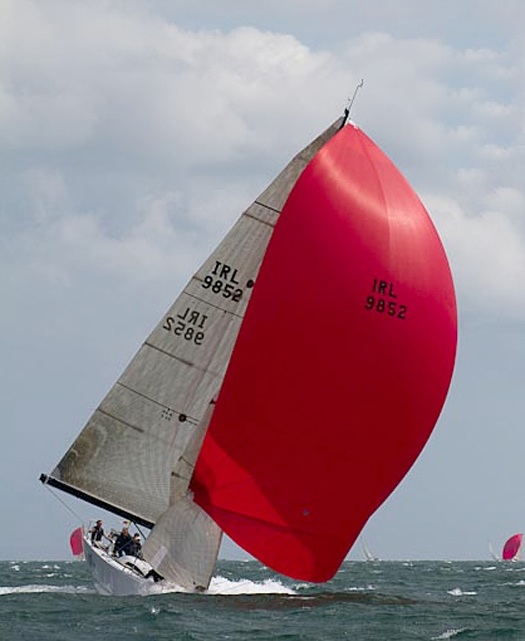
In all her glory. A little bit of sport for Crazy Horse and her crew, some of whom have been sailing with current ICRA Commodore Nobby Reilly for very many years. Photo: Gareth Craig
Next up on the programme after the Come Sailing Day is the ICRA Nationals on Dublin Bay, run from June 13th to 15th in conjunction with the Royal Irish YC. Fleet numbers are already pushing towards a satisfactory level at the hundred-plus mark, but inevitably there will be an East Coast emphasis as there's a biennial Cork Week this year in July.
Time was when the keenest boats and crews would happily take in the Scottish Series, the ICRA Nationals, the Round Ireland Race, Cork Week and the West Cork Regattas, all in one season. But times are changing. We're still recovering from an economic recession which clipped all wings. But there are signs in any case that amateur sailors increasingly prefer to put all their campaigning effort into one big chosen event, and make do with a selection of smaller local series for the rest of the season.
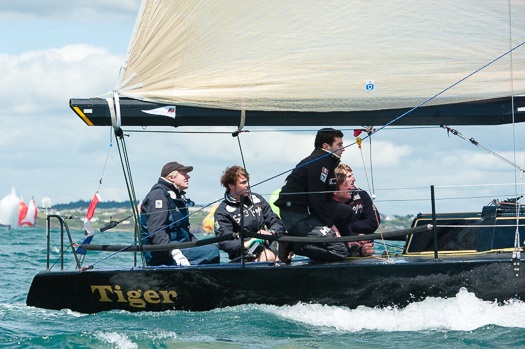
The Kenefick family's front rank Quarter Tonner Tiger from Cork will be racing ICRA Week 2014 in Dun Laoghaire as Nathan Kirwan Trust in a fund-raising campaign. Photo: Robert Bateman
It's those family demands again, something which is now so dominant that anyone of the webbed-foot tendency who expects to sail flat out from one end of the season to the other is regarded as a bit odd. So a viewpoint put forward by Afloat.ie's Water Rat about the need to rationalise the events programme even further is worthy of consideration. But for now the 2014 programme is under way, and it will be instructive to see how it develops, and how the ICRA Executive reacts.
For in addition to many members being involved in the Round Ireland at the end of June, three weeks later the 2014 Commodore's Cup is being staged at Cowes from July 19th to 26th, and Ireland is very much back in the fray after deferring to economic force majeur in 2012, when they didn't mount a defence of their 2010 victory.
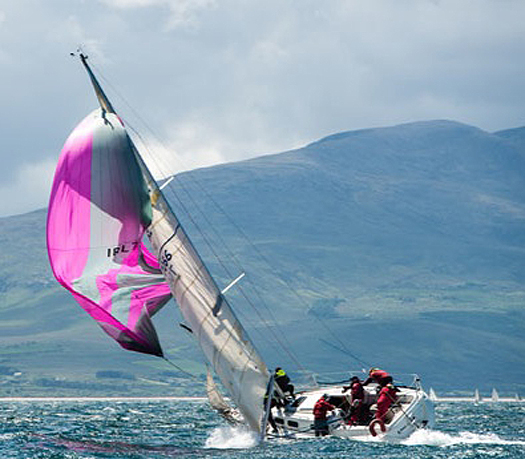
It's Kerry – big mountains, big winds, and all the sport of the ICRA Nationals 2013 at Tralee Bay SC. Photo: Robert Bateman
But at the same time the WIORA Championship is being staged on Clew Bay by Mayo YC. Clew Bay is just about as far as you can get if sailing there from the main sailing centres – once you've passed it, you're heading for home. So there was a plan to take the J/80s there and have clubs send representative crews to race them within the WIORA format. But there's just too much going on, time was against getting it all together for this formidable logistical challenge, so ICRA's man in the west Simon McGibney is concentrating on having the J/80s as a featured part of WIORA Week 2015 in Galway.
Meanwhile, the cruiser-racer and offshore season for 2014 is upon us. ICRA is once again balancing up on the tight-rope, laying on the welcome for newcomers while keeping seasoned campaigners on side. There's no other organisation in Irish sailing life which can think on its feet with the same speed and agility. And the contribution to our sport by the small voluntary staff running this big-hearted operation is a wonder to behold.
ICRA's Sailing Spirit Reasserts Itself as Cruiser Racer Fortunes Improve
#icra – The Irish Cruiser Racing Association has come through challenging times recently, but Commodore Nobby Reilly sees strengthening light at the end of the tunnel. W M Nixon takes a look at ICRA and its upcoming Annual Conference in four weeks time, and somehow concludes his piece with an earthy opinion on keel and rudder design from Ted Turner.
"When you're going backwards, it's hard to stop". Difficult to see where you're going, too. The speaker is Norbert 'Nobby' Reilly, currently serving his five year watch as Commodore of the Irish Cruiser Racing Association, which will hold its Annual Conference on Saturday November 23rd in the Royal Irish YC in Dun Laoghaire. At it, the ICRA Commodore is confident the attendance will share his very strongly held belief that going backwards is now history.
In its eleven short years of remarkable existence, ICRA has embodied the highs and lows of Irish life as we zoomed up to the dizzy heights of the Celtic Tiger years, and then fell off a cliff, plunging to reality after 2008.
When the going was good.....No. Let's re-phrase that. When the going was plain crazy, Irish sailing through ICRA was in the astonishing position of putting forward three teams for the biennial international Commodore's Cup.
To outsiders, it seemed absurd that those teams appeared to be racing against each other with even more venom than they were using against the international rivals. Where was the unwritten code of the green jersey? Not surprisingly, they didn't win the Cup itself, though one team was tantalizingly close. But not to worry, surely there'd be even more new boats and fresh paper millionaires along next time, we'd do better next time round.
Chance would be a fine thing. The writing was already engraved and not merely scribbled on the economic wall when just one Irish team, carefully put together by manager Barry Rose to harbour scarce resources, did finally win the Commodore's Cup in 2010.
It was a peak of achievement for Irish sailing, and despite the fact that ICRA is just basically four people – Barry Rose of Cork, Nobby Reilly of Howth, Fintan Cairns of Dun Laoghire, and number cruncher Denis Kiely of cyberspace – this virtual organization became the Mitsubishi Motors 'Sailing Club of the Year' for 2011, and a very popular choice it was too.
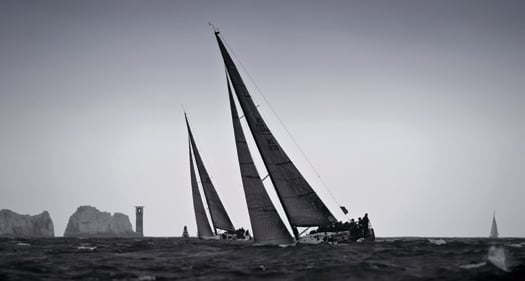
Anthony O'Leary's Ker 39 Antix from Cork was one of the team which finally won the Commodore's Cup for Ireland in 2010. Photo: Kurt Arrigo/Rolex
But by that time the ICRA people had gone back to the knitting, for they knew the prospects for sailing in general – and particularly for Ireland's international offshore racing campaigns – could well get worse before they got better. So though they lived in hope, they threw renewed energy into being the organisation which looks after the needs and hopes of handicap racers in Ireland. While simple enough to outline, it's a complex mission, and in addition to high awareness of international developments, it requires constant monitoring of the mood at grass roots level, for the strength of Irish offshore sailing is drawn from active local clubs all round the coast in addition to the inevitable focus on the big centres around Cork, Dublin and Belfast.
Thus when the blow fell and Barry Rose and his management team had to reluctantly conclude there'd be no prospect of a viable Irish team to defend the Commodore's Cup in 2012, at home the efforts were re-doubled in order to ensure that each year's annual ICRA National Championship was an event worthy of its title, and worthy of past championships. Then too, there was a determination to see that those clubs which had supported the Nationals by sending boats to other venues were in their turn rewarded by an invitation to host the Nationals themselves, with the implicit promise that this would bring fleets of top calibre to new places.
As well, there were visionary programmes to introduce newcomers to offshore racing using many different methods, including open days with the flotilla of the SailFleet J/80s. All this showed that ICRA was very much open for business. And all the time Denis Kiely was keeping the numbers up to date so that there were realistic figures available, giving ready reference for comparisons between IRC and ECHO handicap systems, for one of ICRA's strengths has been that it accommodates people who can't see their way to giving their boat the complete IRC treatment, but can afford to go the ECHO route.
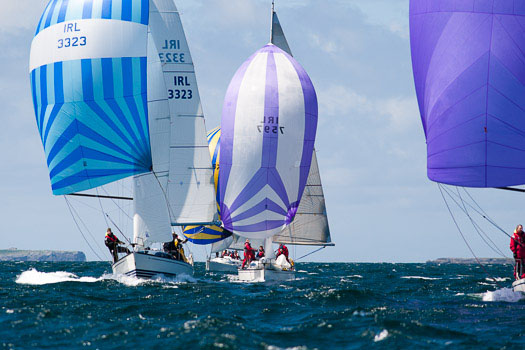
Racing at ICRA National Championship 2013 in Tralee Bay Photo: Bob Bateman
So it is that even with the constraints of Ireland's recent economic experience, ICRA has performed extremely well. Despite some unseasonal weather, the 2013 Nationals at Tralee Bay had some splendid racing, and attracted a fleet of a size and calibre rarely if ever seen beyond Mizen Head.
In addition, Irish boats have been turning in some good showings abroad in addition to the achievements by the top performers at home, and the voters for the coveted ICRA Boat of the Year 2013 award – currently held by the Galway Bay SC Reflex 38 Lynx – have a bewildering array to choose from, as boats which took the prizes at events as diverse as the ICRA Nationals at Tralee and the Sovereigns Cup at Kinsale are joined by those who had success in the Volvo Dun Laoghaire Regatta in Dublin Bay, the top performer there being Nigel Biggs' Checkmate XV which went on to win the World Half Ton Classics.
Then there was the Tralee Bay veteran boat Amazing Grace's victory in the Dun Laoghaire-Dingle Race - as somebody said, she's not called 'Amazing' for nothing – while Lynx as 'Discover Ireland' was well placed in the Fastnet and comfortably tops of all the Irish boats to win the Gull Salver, though we'll resist the temptation to point out that discovering one small but significant part of Ireland is surely what the Fastnet Race is all about.
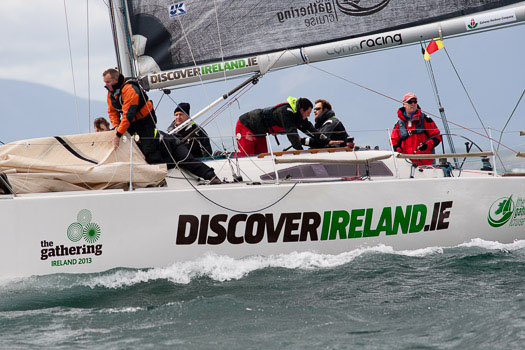
Discover Ireland took the prize in the Fastnet Race. Photo: Bob Bateman
All this is before the more recent rush of achievement, with David Kenefick of Cork with his Figaro Solo boat Full Irish winning the Rookie of the Year award, while there's been the Irish success in crewing in the Middle Sea Race, and Paul Winkelmann has brought good news from the Far East with his Class 1 victory in the China Sea Race.
On the administrative front, ICRA received an unsought but welcome boost when Mike Urwin, the head of the RORC's Measurement Office, reported that the Irish system of using ECHO and IRC handicap systems in cruiser-racer events is something which could usefully be learned from and emulated elsewhere. Maybe so, but anyone contemplating using the ECHO system should note that it works best when people race regularly and frequently, for it is a fact that in Ireland many cruisers which wouldn't be seen as racers at all elsewhere are keen to get onto the starting line, and ICRA makes sense out of what they do.
So Nobby Reilly's confident assertion that forward gear was firmly re-engaged in ICRA during 2013 is clearly borne out by even the most cursory review of the year. Looking ahead to 2014, the prospects are bright. Barry Rose already has the makings of a Commodore's Cup team with one Irish boat and an Irish-crewed American boat already signed up. With that strong foundation in place, it will be fascinating to see how the bids for the third place take shape.
As for the ICRA Nationals, it could well be the biggest yet seen, as it's scheduled for the Royal Irish YC from June 13th to 15th, which will reinforce ICRA's strong fraternal links with ISORA. For international contenders, it also offers the juicy attraction of being neatly located for the Round Ireland Race from Wicklow on Saturday June 24th, with the bonus of the Royal Irish being recognised as an official assembly point for Round Ireland Racers too large to use Wicklow Harbour for the pre-race scrutineering. And for those who'd like to spice their sailing with a spot of high culture, the day after the ICRA Nationals conclude, Monday June 16th is Bloomsday, with a special Royal Alfred YC sailing event which will honour the sailing connections in the writings of James Joyce, which is something we might just examine in detail another day.
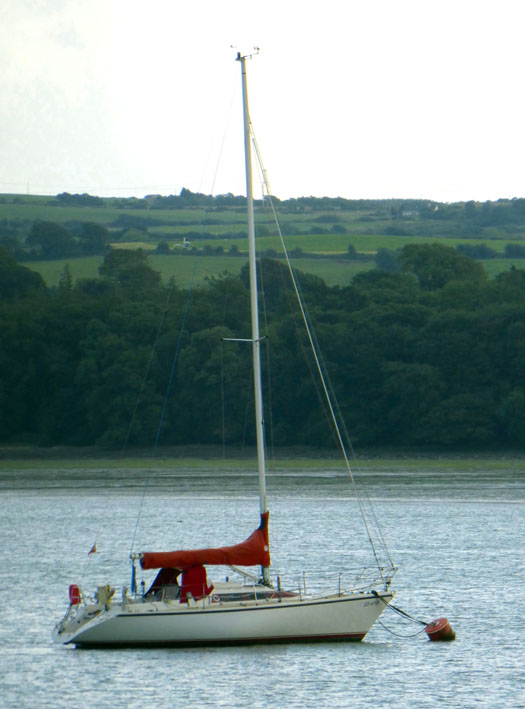
The ICRA management team are always aware that they also have to consider the needs of keen boats and crews based far from the main sailing centres. This is the successful Dis-a-Ray on her home mooring at Tarbert in the Shannon Estuary. Photo W M Nixon
Meanwhile, though the ICRA focus will inevitably be on the east coast in 2014, the Association is well aware of its responsibilities to its fraternal organization, the West of Ireland Offshore Racing Association, which was much involved with 2013's main event in Tralee Bay. In 2014, the WIORA Championship will be at Mayo Sailing Club in Clew Bay from Wednesday 23rd to Saturday 26th July. It's a marvellous venue right on the doorstep of Westport, voted the "Best Place to Live in Ireland" in 2013. But it's so far from the main east coast centres that you're sailing for home whichever way you turn when coming out of Clew Bay. So Nobby Reilly is very keen that the ISA SailFleet J/80s should be taken to MSC's base at Rosmoney and made available for the WIORA Championships for junior crews selected and trained by yacht clubs from other coastlines, which is a brilliant notion.
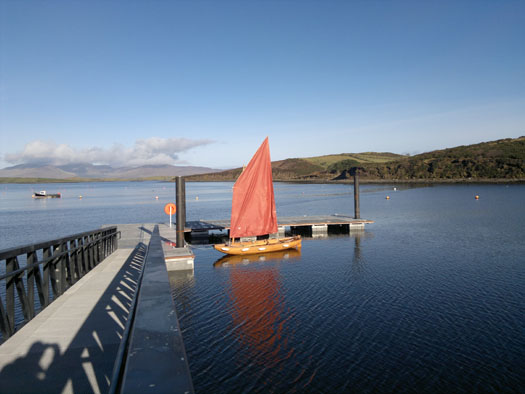
The WIORA Championship 2014 will be at the end of July 2014 at Mayo Sailing Club at Rosmoney in Clew Bay, where this new pontoon is a fine addition to facilities in a sailing area of outstanding beauty. Photo: Rory Casey
But the ICRA Annual Conference will also look beyond the needs of Irish sailing and the Commodore's Cup, as one of the main speaker attractions at the Conference on November 23rd will be Matt Sheahan. He may be the internationally-recognised Technical Editor of Yachting World, but he's one of us, as his folks cam from Dublin, and he also crewed betimes with his old mate Nobby Reilly on Comanche Raider, the big Rob Humphreys-designed offshore racer which was always one of the best-looking boats on the Irish Sea.
After the America's Cup excitement last month, it was Matt's cool on-the-spot analysis of the modifications which the Team Oracle USA people had made during the final series which most clearly brought home to readers just how tiny the game-changing mods could be, yet they helped the Americans come from far behind to retain the trophy.
A particular area of development was the fitting of tiny bulbs to the big catamaran's foils to reduce drag. We are all well aware that the fitting of bulbs under the bows of big ships must be worthwhile, as ship-owners – a notably parsimonious breed – will lash out on such things, confident that they make their vessels more easily driven and therefore more economical. Yet anyone who is accustomed to watching ship and boat hulls move through a seaway will guess that bulbs are at their most effective when there is minimal pitching, as a bulb going up and down, rather than just smoothly forward, will generate a whole new dimension of turbulence.
But the bigger the ship, the less the pitching, and the greater the benefit. When we remember that the America's Cup 72ft catamarans were sailing in what was for them smooth water, the fact that their hulls were not pitching, but rising relatively slowly on the foils, could be accommodated by the bulbs with a level of turbulence which was acceptable in view of the performance benefits shown a few second later. And once the benefit had been shown, the crucial thing then became just how far forward the bulb should be located relative to the foil – it seems an inch or so made a significant difference.
On ships, some bulbs are now remarkably long, with the total underbody being shaped to be as economical as possible in the prevailing conditions in which the ship will be functioning. What will work best averaged over a long period in narrow waters such as the North or English Channels may not necessarily work as well in open ocean, or indeed on wider waterways such as the Irish Sea or St George's Channel, but the Baltic area seems to create ships which work well in our channels.
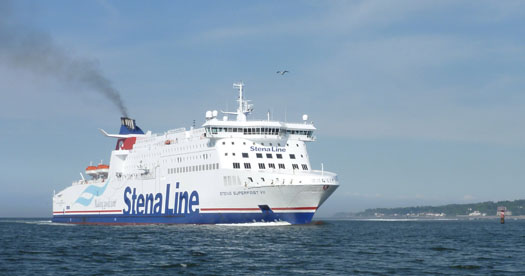
The extra large bulb under the bow of the Stena Superfast VII begins to become more evident as she slows down approaching Belfast. Note her quarter wave on the port side creating surf on the Holywood Bank. Photo; W M Nixon
We were making our way into Belfast early in the summer and one of the 30,000-ton Stena Superfast vessels coming in from Scotland overtook us. In open water, she'd been travelling from Cairnryan in Loch Ryan at 27 knots – which is cooking with gas – but even with a lot of slowing down approaching the head of the lough, she was a big waterborne presence, and we noted her wake breaking spectacularly on the Holywood Bank on her port quarter close astern.
But even more notable as she drew abeam was the bulb, at first immersed under an almost sinister little hill of water, but then revealed with its own bow-wave as the Stena Superfast VII slowed even further. The bulb seemed to be the size of a mini-submarine.
The ships of this marque were originally built for Baltic crossings in 2001 or thereabouts. Stena chartered two of them longterm two years ago, gave them a massive refit with new livery, and put them on the route serving their new £80 million terminal at Cairnryan. With a crossing time of just 2 hours and 15 minutes without the hassle of getting yourself all the way down to Larne for the shorter sea route, it looks as if big bulbs do the business.
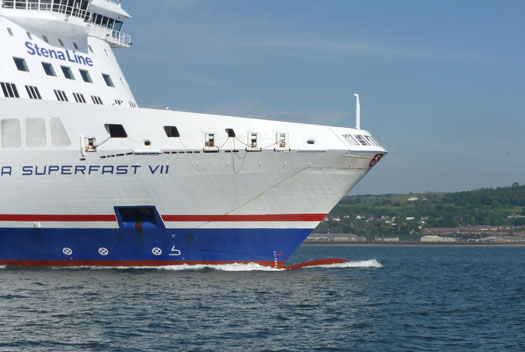
The bulb is the size of a mini-submarine, yet it helps the Stena Superfast VII to travel economically at a very competitive 27 knots on the Belfast-Cairnryan route. Photo: W M Nixon
But as with anything to do with the sea, it all has to be a total package. With bulbs as with boat hulls, you have to think tadpole. A tadpole has a bullet head with a long tail which may primarily provide motive power, yet it takes very little effort to move a tadpole quickly and easily through the water. If it didn't, frogs would have long since become extinct. But it's a relatively straightforward business parting the waters, it's how they close in behind that decides whether tadpoles or boats or bulbs are easily driven.
Down in West Cork, one of our agents (who had better be anonymous this time round) came upon this hull modification near the banks of the Ilen River. Somebody in Skibbereen had clearly taken on board the value of bulbs on the bow, but hadn't quite seen the notion through to complete fulfillment of all requirements.
At first it seems a clever use of Camping Gaz containers, but closer examinaton reveals it is Blugas. Maybe it's only Blugas bottles can be utilized in this way, or maybe it was a cunning advertising ploy to publicise the lesser-known product. Whatever, it looks as though a clever idea hasn't been completely thought through – this Blugas bow bulb needs a tail. And lest you think that we're trying to get this Ilen innovator into fresh expense, Afloat.ie's R & D department reckons just one traffic cone and the cunning use of epoxy, with the new tail filled with builder's foam, is all that is needed.
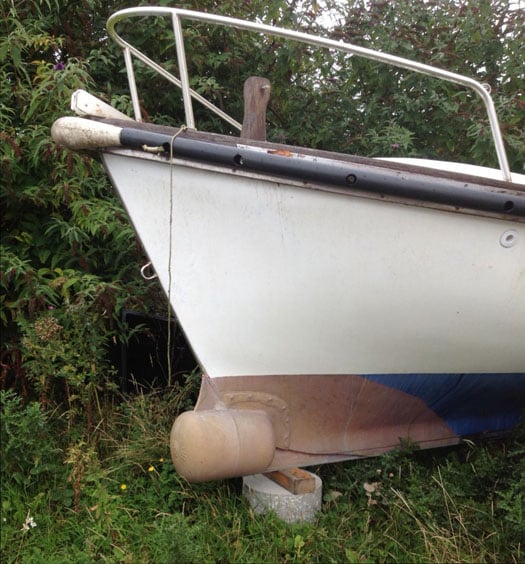
Lateral thinking, West Cork style. Former gas cylinders have been pressed into use to create a bow bulb........
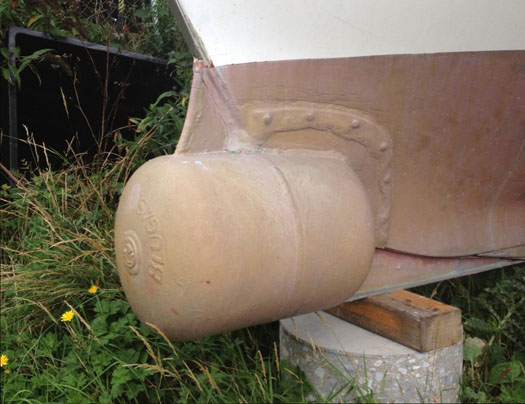
....but we'd suggest the additional use, at the aft end, of a modified traffic cone might produce an even more effective shape.
The final word on the need for a tadpole tail was delivered by the great Ted Turner many years ago, when he was called upon to see if he could get some sort of improved performance out of a new 12 Metre, an America's Cup potential defender designed by the late Britton Chance. In his plans, the perenially innovative designer had replaced the usual sharp trailing edges of keel and rudder with quite wide flat surfaces. He claimed that if these cut-off endings were of the right width, a width which he'd calculated himself down the zillionth degree, then the keel and rudder would create a vortex on their flat trailing surfaces such that the sea would be beguiled into thinking that they actually finished quite a few inches further aft, and finishing moreover in a sharp trailing edge in keeping with accepted practice. With the reduction in wetted surface brought by the cut-off look, light air performance would also be greatly enhanced.
Well, it wasn't, and nor was performance in airs of any kind. You can't fool the sea. So after giving it his best shot, Turner asked if he could see the boat out of the water, as his inability to resist a challenge had meant he'd taken it on sight unseen. So there was the boat still dripping, and the flat back ends all too obvious as Professor Chance launched into a spiel about how it all worked perfectly in theory, and so there must be some other reason for the boat's poor performance.
Turner let him have his say, then demolished the theory. "Britty" said he in his best good old boy style, "Britty, even a standard piece of floating faeces finishes in a point".
Except that the great man didn't use the cumbersome term "standard piece of floating faeces". He used a rough four letter word beginning with 'T'. But this website having a family readership, and it the Bank Holiday weekend too, we won't use the T-word this time round. Have a good weekend.
ICRA Discards 'No Discard' Rule for 2014 National Championships
#icra – The Irish Cruiser Racing Association (ICRA) executive met in Portlaoise at the end of last month and reviewed the 2013 National Championships in Fenit, Co. Kerry revealing a number of changes for the 2014 event scheduled for Dun Laoghaire.
The meeting agreed to abandon its 'no discard provision' for its national championships that was used in Kerry and revert to its earlier provision 'If 6 or more races are sailed 1 discard will apply for next year.
But there will be no change to the professional rule operating at the Fenit event and it was also agreed that the IRC rules were properly applied in Kerry and should be so applied in future.
Present in Portaoise was ICRA commodore Nobby Reilly, Mark Mills, Barry Rose, Peter Stewart, RUYC, Ed Alcock,
Simon McGibney, Fintan Cairns, Ian Travers, Chris Howard, Peadar Murphy and Denis Kiely.
ICRA is to tighen its notice and scoring rules so that clear scoring rules would be published for the future for its team event.
The question of whether a non-ICRA boat can win the National Championships was also raised and as it was an open event it was confirmed non-ICRA boats can win the title.
There was a general discussion about the Fenit event and matters such as marks visibility, abandonment of racing on the Saturday due to high winds [37kts reported] where various views were expressed. It was also agreed that there should be closer ICRA liaison with the Race Officers during the regatta.
In relation to the race schedule it was agreed that in future the general policy to be observed by race officers would be that, taking into account weather conditions, as many races as possible [3 races] would be held in the early part of the regatta i.e. every suitable opportunity to get in a race would be taken, and that the SIs should be written to reflect this policy.
After lengthy discussion, the dates agreed with the Royal Irish Yacht Club for the 2014 event - 13th to 15th June 2014 - were approved.
Foxall to Make Round World Presentation at ICRA Conference
#icra – Successful offshore sailor Damian Foxall will make a presentation at this month's ICRA conference in Kilkenny in a fortnight's time entitled: 'Nine Round the World Races Success or Failure?
It will be a further highlight presentation to round off a day that also sees top International Irish Race officer Jack Roy give an account of his experience as a Race Officer at the 2012 Olympics. He will also offer the opportunity to exchange ideas with a leading Race Officer on developments for Cruiser Racing formats.
Kinsale's Ian Travers will also be doing a presentation on small boat sailing and exciting developments in restoring quarter ton yachts for National and International competition.
Ideas for developing a Sail Training Academy by ICRA will also be floated and there will be update on Brewin Dolphin Commodores Cup developments including Irish attempts to field a team to contest the next event in 2014.
Reviews of ICRA Nationals will include a decision on discard format and launch of 2013 event in Fenit.
Venues for future ICRA National Championships will also be discussed. The event is heading for Dun Laoghaire in 2014.
November 17 promises to be an interesting day when all cruiser racing sailors are welcome to attend and have opportunity to exchange ideas on how best Cruiser Racing can develop in the future.
The day will Start at 11am and finish about 4pm in good time for the Rugby match.
ICRA ANNUAL CONFERENCE AGENDA 2012
#icra – The Irish Cruiser Racer (ICRA) conference in Kilkenny will feature a change in format next month when Commodore Barry Rose introduces a round table discussion for the one day event on November 17th at the Newpark hotel. As well as the 2013 National Championship format for Fenit, Co. Kerry ICRA will announce its 2012 Boat of the year.ICRA - ANNUAL CONFERENCE 2012. Full agenda below
ICRA ANNUAL CONFERENCE AGENDA 2012
NEWPARK HOTEL KILKENNY
SATURDAY 17TH NOVEMBER – 10.30AM TO 4.30PM (Agenda A4 v for print out attached below
Barry Rose - Commodore
Members of Executive Committee
Barry Rose, Commodore. Norbert Reilly, Vice-Commodore. Fintan Cairns, Treasurer. Denis Kiely, Secretary. Michael Murphy, PR. Ed Alcock, ISA. Peter Beamish. Richard Colwell. Chris Howard. Simon McGibney. Mark Mills. Peadar Murphy. Peter Ryan. Vincent O'Shea. Brian O'Sullivan. Ian Travers.
AGENDA
MORNING SESSION - 10:30-13:00
• ANNUAL REPORT – BARRY ROSE, COMMODORE ICRA
Review of 2012 cruiser racing season followed by discussion.
• FINANCIAL REPORT – FINTAN CAIRNS, TREASURER
• APPOINTMENT OF NEW COMMODORE – NORBERT REILLY.
o Norbert will make a short presentation on the role of ICRA
• REVIEW OF 2012 NATIONAL CHAMPIONSHIPS HOSTED BY HYC, 25-27 MAY
o Richard Colwell to present skipper survey report.
• PROGRESS REPORT AND DISCUSSION ON PLANS FOR 2013 NATIONALS TO BE HELD IN TRALEE
o Notice of Race
o Discards and number of races
o Mix and Length of courses/races? 1.15 -1.30 typical duration. One long – 3-4 hr – race?
o Corinthian Cup and Non-spinnaker racing
o Prizes and Prize giving
o Other
• VENUES FOR NEXT CYCLE OF NATIONAL CHAMPIONSHIPS, 2014-2020 – NEW VENUES TO BE CONSIDERED. Principles - Event is stand-alone and all suitable venues will be considered. To consider presentations from interested clubs.
• RATING AND HANDICAPPING – REPORT FROM IRC CONGRESS 2012
• COMMODORES' CUP – THE FUTURE
o Progress report on establishment of offshore cruiser racing training program
• ALL-IRELAND HELMSMANS CHAMPIONSHIP
o Discussion on new nomination system introduced in 2012
• DISCUSSION ON DEVELOPMENTS ON OFFSHORE RACING
o Feeder Races to ICRA Nats in Tralee? From Dublin, Cork and Galway? perhaps in conjunction with Dun Laoighaire-Dingle
AFTERNOON SESSION – 14:00-16:30
JACK ROY [INTERNATIONAL RACE OFFICER] ON THE WEYMOUTH OLYMPICS
An opportunity to exchange ideas with a leading Race Officer on developments on cruiser race management, course types etc.
PRESENTATION BY IAN TRAVERS ON PREPARATION & RACING OF ¼ TON TYPE BOATS
'Small boat sailing with a focus on finding, rebuilding and IRC optimising a 'worn out' Quarter Tonner.'
PRESENTATION BY DAMIAN FOXALL, IRISH OFFSHORE SAILOR
ICRA - ANNUAL CONFERENCE 2012
• 'BOAT OF THE YEAR' PRESENTATION
Irish Team Details Eagerly Awaited for Commodore's Cup 2012
#COMMODORES CUP – Although Ireland is officially slated by the Royal Ocean Racing Club to be defending its 2010 title won on the Solent there is still no details of the compostion of an Irish team for July's Commdore's Cup.
Ireland face an uphill struggle to mount a credible defence, though Antony O'Leary's Antix is most likely to be a key part of any team, which is a major asset, there is still the job of completing the three boat line-up. A call to interested parties was made late last year by the Irish Cruiser Racing Association (ICRA).
ICRA Commodore Barry Rose says that despite the current difficult environment ICRA remains hopeful of mounting a serious defence and have waited until last October to allow the maximum time to those who may consider supporting the challenge but since then there has been no further news of the team.
The Commodores Cup takes place from 21st to 28th July 2012 based in Cowes. Ireland first won this prestigious International Trophy in 2010 .
Captain of the winning team Anthony O Leary told Afloat.ie: 'We finally won this great event in 2010 with a well organised campaign. Let's hope we
can return to defend it in 2012 learning further from that experience'.
Interest from teams wishing to stake a claim on the prestigious Brewin Dolphin Commodores' Cup is running high with challenges from several nations including: England, Netherlands, France, Ireland and Hong Kong. Eddie Warden Owen, Chief Executive of organisers, the Royal Ocean Racing Club (RORC), is very happy with the way things are shaping up for the 11th biennial event:
"It would appear that the new format of allowing teams to be made up of three boats of any size and the availability of good boats to charter, has prompted interest from outside of Europe too. The Brewin Dolphin Commodores' Cup is shaping up to be a very competitive regatta."
Volvo Ocean Race skipper, Bouwe Bekking has been announced as Captain of the Dutch team, with the possibility of two Dutch teams and talk of a combined Benelux team of Dutch and Belgian boats.
"The Brewin Dolphin Commodores' Cup (BDCC) is a great event. It is giving owners and their predominantly amateur crews, the ability to sail for their own country and in a real team event. The BDCC is nearly the only national team event left in offshore racing. It will provide tough competition and in addition, racing in the Solent will give the event that extra dimension that owners are looking for. For me, it will be the first time as Team Captain for the Netherlands. It sounds more prestigious than the role actually is. The fact is that the three boats have to perform well individually in order that the team can do well overall. But there are a lot of small aspects which can help make them a better team in my opinion. I will try to give them that extra support and insight from all the experiences I have learned from all the Admiral's, Commodores' and Sardinia Cups I have participated in," commented Bekking.
John van der Starre from The Dutch Class Organisation, Noordzeeclub based in The Hague: "We are very pleased that Bouwe will be Team Captain. He has great experience and will drive the team. We will have more news on boats and teams in February, but already have six yachts hoping to compete: Baraka GP, Display, Captain Jack, Redan, J Xcentric and TeamVanVuuren."
The Dutch selection procedure will take place during the two first big IRC events of the year, with trials at the Van Uden Reco Stellendam Regatta (21-22 April) and the Delta Lloyd North Sea Regatta (15/20 May), including the Vuurschepen Race (25/28 May) and RORC North Sea Race.
Teams from the Netherlands have competed in the biennial Commodores' Cup since its inception in 1992, only missing out in 2000 and 2010. They have not yet won the Commodores' Cup but finished on the podium in 1998 and 2002.
Strong Interest from GBR teams
In early January the Royal Yachting Association (RYA) Selection Committee met with owners and representatives of 19 boats who were interested in participating in trials for the English teams to compete.
"We were delighted with the turnout for the initial meeting which was much better than I expected and great for the event, as well as for sailing in the UK," said Stacey Clark, the new Chairman of the RYA Council and Chairman of the Commodores' Cup Selection Committee.
John Derbyshire, RYA Racing Manager/Performance Director:"I am delighted to see so much interest, both from previous competitors and potential new team members in being selected for one of the GBR teams. This should provide an excellent trials series from which a team that can win the Brewin Dolphin Commodores' Cup should emerge - as well as providing a competitive base for future events. There was a great atmosphere at the meeting and we look forward to taking on teams from around the world!"
The Selection Trial events have been confirmed for RYA Team GBR:
Offshore - the RORC Morgan Cup starting on 5th May. A 24-36 hour race round buoys in the Channel, starting and finishing in Cowes. Inshore - a Commodores' Cup rating band class in the Vice Admirals Cup on 18th -20th May, organised by the Royal Corinthian Yacht Club in Cowes.
The rules allow for up to four teams per country and one place has already been offered to Scotland who have until the end of February to confirm a team entry. If the Scottish sailors decide not to take the opportunity, then an additional three boats could make up a four team challenge from England.
In 2008 RYA Team GBR won the Commodores' Cup and narrowly missed out to Ireland in 2010. This year, the aim will be to pick four teams who have the potential to win this Summer as well as in future years.
2012 marks the 3rd consecutive challenge from Hong Kong for the Brewin Dolphin Commodores' Cup and the sailors in this southern most part of China are working hard to put together a strong team which will emulate or better their runners-up placing in 2010.
Possibly making a return to the fray is long-time stalwart of the Royal Hong Kong Yacht Club (RHKYC), Keith Jacobs, who sailed in several Admiral's Cups with his Dubois-designed Bimblegumbie and has recently returned to the club from Australia. This time Keith is a co-owner of the Kerr 40, Signal 8 which has just launched in Hong Kong and is headed up by co-owners Jamie McWilliam and Patrick Pender, the latter of whom who will drive the boat.
Likely to skipper a boat as well is Nick Burns who campaigned the Mills 40 Mandrake in the Hong Kong 2010 team, and well known Cowes Etchell sailor, Ante Razmilovic - now living in Hong Kong - is also working to put together a crew with Chris Opielok who skippered the small boat Rockall in 2010. Also donning wet weather gear in the Solent this summer will be RHKYC Vice Commodore Joachim Isler, who will return for his third campaign on one of the boats along with his Hong Kong boat partner, Aussie Andrew 'Drew' Taylor.
"Hong Kong's sailors love the world's best big-boat team event and are determined to keep coming back until they win it," says Team Coordinator, Laurence Mead who was helmsman of Mandrake in the 2010 Hong Kong challenge.
Hong Kong has taken part in the Commodores' Cup three times in 1992 (7th), 2008 (5th) and 2nd in 2010.
Ireland Go Offshore (Podcast with Barry Rose Here)
This morning (Tuesday) sees the start of the Commodores' Cup Offshore Race that counts for 2.5 times the points of a normal inshore race. The course is intended to last between 24 and 36 hours in duration and by the conclusion, just over half the points for series will have been won. It's a tricky one for Ireland because its where we have lost the regatta in the past. More importantly event stats show that our nearest rivals this year, the French and British teams, have proved strongest offshore in the past. We asked Team manager Barry Rose for the latest this morning. Click below to listen to the podcast:
Ireland Leads By 20.5 Points after Day Two of the Commodores' Cup
After two more windward leeward races in bright sunshine and 15-18 knot winds Ireland's Antix scored a joint first and a second in the Rolex Commodores' Cup today. Marinerscove scored a fourth and a second. Roxy was seventh and first. After four races now sailed on the Solent, Ireland leads by 20.5 points from UK Red. France Blue is third on 51.50 points. More reports and photos later.
Monday: Ireland Proceed with Care on the Solent (Podcast HERE!)
In spite of Ireland's domination of the first races of the Commodore's Cup, Irish Cruiser Racer Association (ICRA) Commodore Barry Rose says it is far too early for celebration in the Irish camp. After all they have been here before a number of times. Hear the latest from Rose this morning as the teams go afloat for a breezy two races today, exactly the sort of conditions that favour the Irish trio.
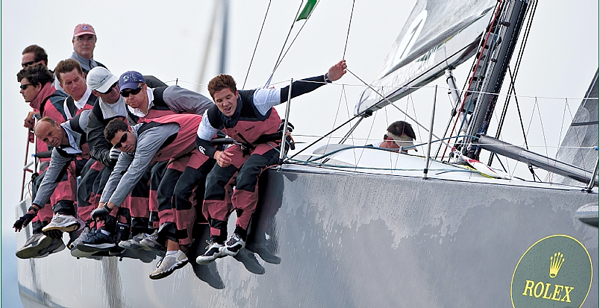
Ireland's Antix in action. Her crew inlcudes last week's Skandia Sail for Gold Regatta winner Peter O'Leary. Photo: Kurt Arriga
Equinox and Antix Take Scottish Honours
A young Irish crew from Howth topped IRC Class 4, the biggest class which had 20 entries at the Scottish Series this evening. Ross McDonald and the crew of the Howth based X332 Equinox strung together a first and two second places from the final three races to win the class by four points from last year's class winners on the J92 NiJinsky. Robert Yates and his crew won both races today but finished second by four points ahead of the Davidson 36 Hops which had lead into the final day but which could only make a fifth and seventh today.
Anthony O'Leary and his Cork crew of the Ker 39 Antix conclusively won IRC Class 1 after posting a further two victories today in near perfect conditions. O'Leary, a long time supporter of the Scottish Series has won twice before in 2004 and 2006.
Counting six wins from eight starts in the nine boat strong class, Antix has been impressive across the wind ranges, proving the team are in good shape for the upcoming Rolex Commodore's Cup international team regatta in August.
Their class had depth including another three past winners of the overall top trophy in second, third and fourth places.
After more than three decades of trying with probably as broad a variety of different yachts that any one owner-skipper has campaigned at this key regatta with - from a slippery 37 foot ultra light Selection production race boat to a heavy Trintella 42 foot cruising boat - veteran Clyde owner-skipper John Corson and his long serving crew of the immaculately prepared Corby 33 Salamander XX lifted the Scottish Series Trophy, the top award for the annual Brewin Dolphin Scottish Series this evening.
"I am shocked and stunned." Said an emotional Corson, 80. " I don't know what to say. We have been so close so many times before that you just never know what is going to happen, or who it is going to go to. So I think most of all I just feel so relieved."
His win is a popular one. Corson has been a huge supporter of Clyde racing, and perhaps the most zealous participant over many years, competing from early season frostbite races right through until December year in year out. He has introduced many youngsters
His win, along with a crew of whom some have sailed with him for nearly 20 years, comes after many near misses. The veteran shed a tear or two before accepting the top trophy, just as his team did in 2005 when they were leading their class with a string of wins when their mast crashed down and their regatta was ended prematurely.
"This is a really, really special thing for John. He has always wanted to win this. In a sense this is his Olympics, the biggest thing in sailing for him so it is a real honour to have contributed. We have been close before, but this time things came together. After last year we had plugged the gaps which we felt we might still have in terms of optimising the boat, the crew work is really exemplary and the result of many long hours on the water over the years. So this is very special." Said John Highcock, the Clyde sailmaker who steered Salamander XX.
"It is so well deserved. Totally right." Commented double winner Anthony O'Leary
Corson and his crew won seven of their eight races in IRC Class 3, dropping an eighth as their allowable discard. With Clyde sailmaker John Highcock steering, Salamander XX's performance today was nothing short of electric. Twice today they were quick enough to be ahead of the leaders of Class 2 which had started five minutes ahead.
IRC Class 2 went right to the final race with the Clyde brothers Richard and Paul Harris triumphing after posting a third and a second on their Iain Murray designed Sydney 36.
The challenge from the Welsh-Irish new Corby 36 Roxy 6 faded notably in the lighter conditions of Sunday. Chris Bonar's BH36 Bateleur 97 finished with a flourish, two first places today, but that was not enough for them to catch their Clyde compatriots and they had to settle for third overall.
The only crew to have won all of their races right the way through the regatta is Ruairadh Scott's team on King Quick in Sportsboat Class 1. They counted eight first places from nine starts and were certainly among the elite group of contenders for the overall top trophy.





























